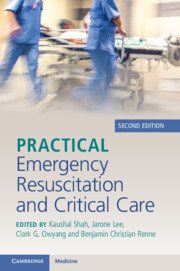Book contents
- Practical Emergency Resuscitation and Critical Care
- Practical Emergency Resuscitation and Critical Care
- Copyright page
- Contents
- Contributors
- Preface
- Section 1 General Critical Care
- Section 2 Infectious Disease Emergencies
- Section 3 Neurological Emergencies
- Section 4 Cardiovascular Emergencies
- Section 5 Respiratory Emergencies
- Section 6 Gastrointestinal Emergencies
- Section 7 Renal Emergencies
- Section 8 Hematology–Oncology Emergencies
- 37 Reversal of Anticoagulation
- 38 Thrombotic Thrombocytopenic Purpura/Hemolytic Uremic Syndrome and Disseminated Intravascular Coagulation
- 39 Sickle Cell Emergencies
- Section 9 Endocrine Emergencies
- Section 10 Environmental Emergencies
- Section 11 Trauma
- Section 12 End of Life
- Index
- References
37 - Reversal of Anticoagulation
from Section 8 - Hematology–Oncology Emergencies
Published online by Cambridge University Press: 02 November 2023
- Practical Emergency Resuscitation and Critical Care
- Practical Emergency Resuscitation and Critical Care
- Copyright page
- Contents
- Contributors
- Preface
- Section 1 General Critical Care
- Section 2 Infectious Disease Emergencies
- Section 3 Neurological Emergencies
- Section 4 Cardiovascular Emergencies
- Section 5 Respiratory Emergencies
- Section 6 Gastrointestinal Emergencies
- Section 7 Renal Emergencies
- Section 8 Hematology–Oncology Emergencies
- 37 Reversal of Anticoagulation
- 38 Thrombotic Thrombocytopenic Purpura/Hemolytic Uremic Syndrome and Disseminated Intravascular Coagulation
- 39 Sickle Cell Emergencies
- Section 9 Endocrine Emergencies
- Section 10 Environmental Emergencies
- Section 11 Trauma
- Section 12 End of Life
- Index
- References
Summary
The use of direct oral anticoagulants (e.g., dabigatran, rivaroxaban, apixaban, edoxaban) over more traditional agents such as warfarin has significantly increased over the past decade. These patients require prompt reversal of their bleeding diathesis during resuscitation.
Keywords
Information
- Type
- Chapter
- Information
- Practical Emergency Resuscitation and Critical Care , pp. 379 - 386Publisher: Cambridge University PressPrint publication year: 2023
